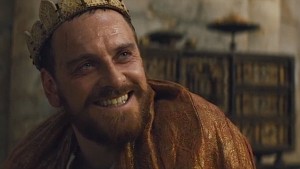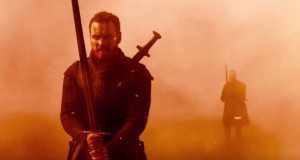
Well, if you’ve ever been to high school, you’re probably already familiar with Shakespeare’s Macbeth. This tragedy has been brought to the silver screen a few times over the years (although none have been quite as striking as the 1971 version). The latest attempt is a solid adaptation that boasts some excellent production design and cinematography.
 For those who skipped class, Macbeth (Michael Fassbender) is a general who encounters three witches. They deliver a prophecy that he is destined to be the King of Scotland. Spurred on by the ambitious Lady Macbeth (Marion Cotillard), the two decide to claim the throne immediately. Together, they plot the murder of Duncan (David Thewlis), the country’s current King. However, after taking control, paranoia and fear sets in, sending the appointed sovereign on a bloody rampage to wipe out any perceived threat to his throne.
For those who skipped class, Macbeth (Michael Fassbender) is a general who encounters three witches. They deliver a prophecy that he is destined to be the King of Scotland. Spurred on by the ambitious Lady Macbeth (Marion Cotillard), the two decide to claim the throne immediately. Together, they plot the murder of Duncan (David Thewlis), the country’s current King. However, after taking control, paranoia and fear sets in, sending the appointed sovereign on a bloody rampage to wipe out any perceived threat to his throne.
Yes, this is an official Shakespeare play, so if you’re expecting updated dialogue or a lot of creative liberties with the material, you’ve come to the wrong movie. With a few minor exceptions, this adaptation is largely faithful to the original story. The biggest change is merely in the way it is shot.
What helps this version set itself apart from many others is the striking visuals. The production is dark and gritty and the locations are particularly arresting, from the visibly grey and chilly battlefield to Macbeth’s home village, partially encased in fog. The modest buildings provide a unique and interesting change from the castle sets one would normally expect.
 Battle scenes are also impressively mounted by the filmmakers, using slow-motion shots to depict soldiers crashing into each other during combat. In some respects, the grimy approach mirrors the production design of shows like Game of Thrones. Most notable may be the final confrontation, in which fields are lit ablaze and two raging characters fight it out in front of a blazing fire. It’s another nice touch that helps emphasize the lead character’s mental state.
Battle scenes are also impressively mounted by the filmmakers, using slow-motion shots to depict soldiers crashing into each other during combat. In some respects, the grimy approach mirrors the production design of shows like Game of Thrones. Most notable may be the final confrontation, in which fields are lit ablaze and two raging characters fight it out in front of a blazing fire. It’s another nice touch that helps emphasize the lead character’s mental state.
As expected, the cast are exceptional. In an attempt to add a sense of realism, many of the cast members also sport an appropriate brogue accent and mutter their dialogue. It largely works and lends credibility to the proceedings. The only minor qualm comes with the role of Lady Macbeth. It may be the condensed approach to events (and honestly the issue may be with the source material itself), but in this version she veers towards remorse more quickly than anticipated. The “sleepwalking” scene comes across as a simple admission of regret without any of the subconscious or dreamlike flourishes many will be expecting. Cotillard is excellent in the role regardless.
Of course, if you’re not a fan of Shakepeare, this movie isn’t for you. But if you enjoy the play or are simply interested in familiarizing yourself with Macbeth, this is a solid adaptation. It may not be quite as arresting as the 1971 version, but it presents the story efficiently and offers a few extra swords clanging and action beats to keep events moving. In the end, it would certainly beat being introduced to the play in a classroom, along with awkward line readings from students.


